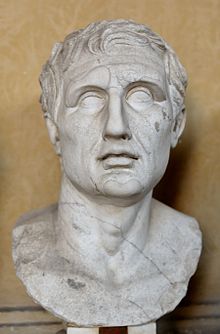മെനേൻഡെർ
ദൃശ്യരൂപം
| Menander | |
|---|---|
 | |
| ജനനം | 342/41 BC Kephisia, Athens |
| മരണം | c. 290 BC |
| വിദ്യാഭ്യാസം | Student of Theophrastus at the Lyceum |
| Information | |
| വിഭാഗം | New Comedy |
| Notable work(s) | |
ഗ്രീക്ക് നാടകപ്രവർത്തകനും അഥീനിയൻ ന്യൂ കോമഡിയിൽ ഏറ്റവും പ്രശസ്തനാണ് മെനേൻഡെർ (/məˈnændər/; ഗ്രീക്ക്: Μένανδρος, Menandros; c. 342/41 – c. 290 BC) [1]. നൂറിലധികം ഹാസ്യങ്ങളുടെ രചയിതാവാണ് ഇദ്ദേഹം ലെനൈനാ ഉൽസവത്തിൽ എട്ട് തവണ സമ്മാനം നേടിയ വ്യക്തിയുമാണ് അദ്ദേഹം[2].ഡിയോനിസിയ നഗരത്തിലും ഇദ്ദേഹത്തിന്റെ പ്രകടനം ഇതുപോലെ ഗംഭീരമാണെങ്കിലും അതിന്റെ കണക്കുകളില്ല. പുരാണ രചയിതാക്കളിൽ വളരെ പ്രശസ്തനാണ് ഇദ്ദേഹം.മധ്യകാലഘട്ടത്തിൽ ഇദ്ദേഹത്തിന്റെ ഭൂരിഭാഗം രചനകളും നഷ്ടമായി.ഇന്ന് കാണുന്ന രചനകൾ കൂടുതലും മുറിഞ്ഞ രൂപത്തിലുള്ളവയാണിവയിൽ കൂടുതലും ഇരുപതാം നൂറ്റാണ്ടിലാണ് കണ്ടെത്തിയത്. ഡ്യസ്ക്ലോസ് എന്ന ഒറ്റ നാടകം മാത്രമാണ് ഇന്നും പൂർണമായി അവശേഷിക്കുന്നത്.
കോമഡികൾ
[തിരുത്തുക]പൂർണ്ണമായ രചനകൾ
[തിരുത്തുക]- Aspis ("The Shield"; about half)
- Dyskolos ("The Grouch" or "Old Cantankerous"; the best preserved play)
- Epitrepontes ("Men at Arbitration"; most)
- Perikeiromene ("Girl who has her hair cropped"; George Bernard Shaw suggested Rape of the Locks, after Alexander Pope; about half)
- Samia ("Girl from Samos"; four out of five sections)
- Sikyonioi or Sikyonios ("Sicyonian(s)"; about half)
അപൂർണ്ണം
[തിരുത്തുക]
|
|
അവലംബം
[തിരുത്തുക]- ↑ Konstan, David (2010). Menander of Athens. Oxford: Oxford University Press. pp. 3–6. ISBN 0199805199.
- ↑ Apollodorus: Chronicle, fr.43
പുറത്തേക്കുള്ള കണ്ണികൾ
[തിരുത്തുക]- An English translation Archived 2009-03-07 at the Wayback Machine. of the Dyskolos.
- Dyskolos, translated by G. Theodoridis
- Perikeiromene, translated by F. G. Allinson
- Menander: Monosticha / Sententiae / Einzelverse Archived 2008-10-13 at the Wayback Machine. – Sentences from Menander's work in the original Greek and translated in Latin and German
- SORGLL: Menander, Dyskolos, 711–747; read by Mark Miner Archived 2011-07-19 at the Wayback Machine.
